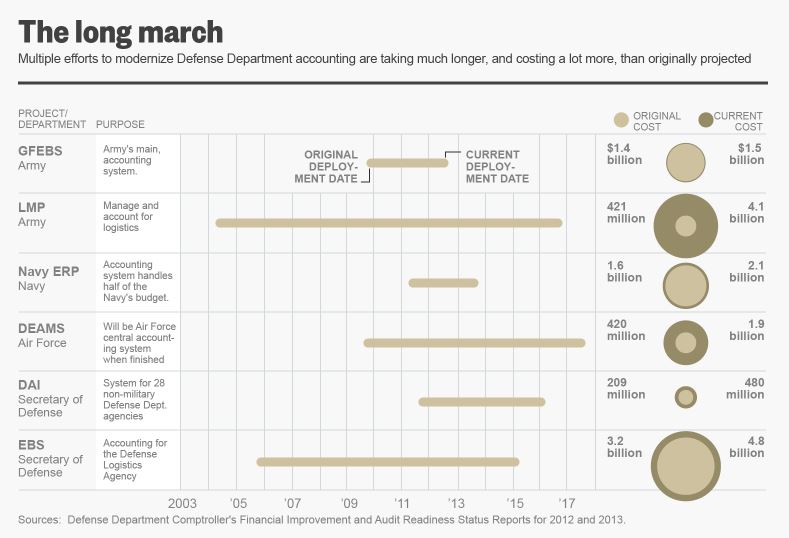The Defense Department over the years has been notorious for its lax accounting practices. The Pentagon has never completed an audit of how they actually spend the trillions of dollars on wars, equipment, personnel, housing, healthcare and procurements.
An increasingly impatient Congress has demanded that the Army achieve “audit readiness” for the first time by Sept. 30, 2017, so that lawmakers can get a better handle on military spending. But Pentagon watchdogs think that may be mission impossible, and for good reason.
Related: Why the Pentagon Budget Is Out of Control
A Department of Defense inspector general’s report released last week offered a jaw-dropping insight into just how bad the military’s auditing system is.
The Defense Finance and Accounting Service, the behemoth Indianapolis-based agency that provides finance and accounting services for the Pentagon’s civilian and military members, could not provide adequate documentation for $6.5 trillion worth of year-end adjustments to Army general fund transactions and data.
The DFAS has the sole responsibility for paying all DOD military and personnel, retirees and annuitants, along with Pentagon contractors and vendors. The agency is also in charge of electronic government initiatives, including within the Executive Office of the President, the Department of Energy and the Departing of Veterans Affairs.
There’s nothing in the new IG’s report to suggest that anyone has misplaced or absconded with large sums of money. Rather, the agency has done an incompetent job of providing written authorization for every one of their transactions – so-called “journal vouchers” that provide serial numbers, transaction dates and the amount of the expenditure.
Related: How the Pentagon Cooks the Books to Hide Massive Waste
In short, the DFAS has lagged far behind in providing the tracking information essential to performing an accurate audit of Pentagon spending and obligations, according to the IG’s report.
“Army and Defense Finance and Accounting Service Indianapolis personnel did not adequately support $2.8 trillion in third quarter adjustments and $6.5 trillion in year-end adjustments made to Army General Fund data during FY 2015 financial statement compilation,” wrote Lorin T. Venable, the assistant inspector general for financial management and reporting. “We conducted this audit in accordance with generally accepted government auditing standards.”
A further mystery is what happened to thousands of documents that should be on file but aren’t. The IG study found that DFAS “did not document or support why the Defense Departmental Reporting System . . . removed at least 16,513 of 1.3 million records during Q3 FY 2015. As a result, the data used to prepare the FY 2015 AGF third quarter and year-end financial statements were unreliable and lacked an adequate audit trail,” the IG’s report stated.
The troubling findings emerged from a wide-ranging audit of the capital funds and financial statements across the military services, including the Navy, the Marine Corps and the Army.
The problem is no secret to investigative reporter Scot Paltrow at Reuters, who exposed outrageous fraud and abuse in a three-part series in 2013 called, “Unaccountable.”
He wrote:
“For two decades, the U.S. military has been unable to submit to an audit, flouting federal law and concealing waste and fraud totaling billions of dollars.
Linda Woodford spent the last 15 years of her career inserting phony numbers in the U.S. Department of Defense’s accounts.
Every month until she retired in 2011, she says, the day came when the Navy would start dumping numbers on the Cleveland, Ohio DFAS…. Using the data they received, Woodford and her fellow accountants there set about preparing monthly reports to square the Navy’s books with the U.S. Treasury’s…. And every month, they encountered the same problem. Numbers were missing. Numbers were clearly wrong. Numbers came with no explanation of how the money had been spent or which congressional appropriation it came from.”
Related: The 10 Most Expensive Weapons in the Pentagon’s Arsenal
The IG has cautioned in the past that journal voucher adjustments should comply with applicable regulations, which require adequate documentation for each transaction. The June 26 IG’s report made a number of requests and suggestions that DFAS officials and the Pentagon have agreed to go comply with.
The top suggestion is the most obvious one: that DFAS enforce “the applicable guidance” periodically issued by the Under Secretary of Defense Comptroller “regarding journal voucher category identification codes and metric reporting.”
“Until the Army and DFAS Indianapolis correct these control deficiencies, there is considerable risk that AGF financial statements will be materially misstated and the Army will not achieve audit readiness by the congressionally mandated deadline of September 30, 2017,” the report warned.






